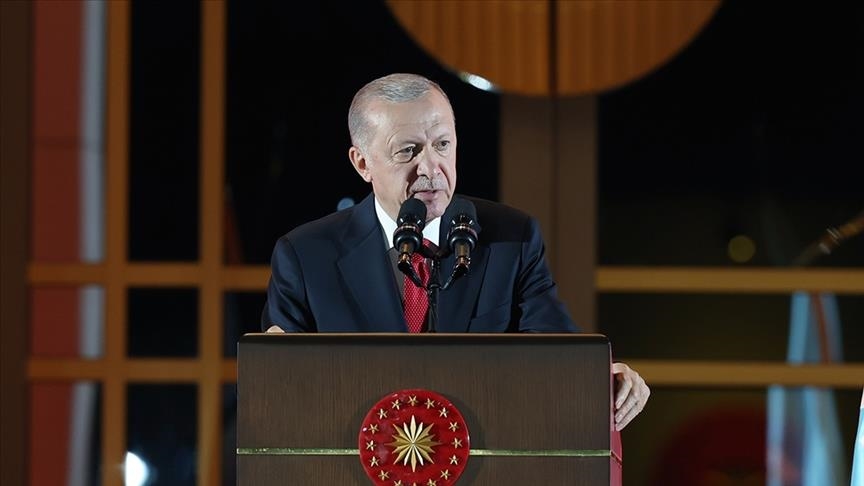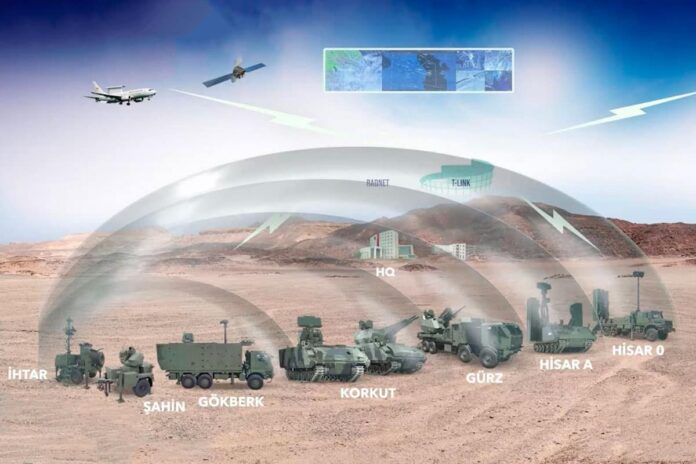In a major move to fortify Turkey’s defense infrastructure, President Recep Tayyip Erdogan announced plans to develop a comprehensive air defense system dubbed the ‘Steel Dome.’ Modeled after advanced multi-layered defense systems, Turkey’s Steel Dome aims to protect against a range of aerial threats, providing a shield over the nation’s critical assets. Erdogan also stated that Turkey would expand its long-range missile capabilities, marking a strategic push toward self-reliance in defense.
The announcement follows a recent terror attack targeting the headquarters of Turkish Aerospace Industries, underscoring the urgent need for enhanced security.
‘Steel Dome’: Turkey’s Vision for a Secure Future
Turkey’s envisioned Steel Dome is set to be a multi-layered air defense system, capable of intercepting various aerial threats, including drones, missiles, and aircraft. Erdogan’s ambitions reflect Turkey’s determination to develop independent defense solutions to secure its airspace without relying on foreign systems. This system would echo the functionality of Israel’s Iron Dome and other sophisticated defense mechanisms deployed globally.
By investing in a domestic defense system, Turkey seeks to reduce dependence on imports and foster indigenous innovation within its defense sector. “We will not rest until Turkey achieves full independence in its defense industry,” Erdogan said, signaling a significant leap for Turkish defense manufacturing.

Expansion of Long-Range Missile Capabilities
Beyond the Steel Dome project, Erdogan emphasized plans to boost Turkey’s long-range missile capabilities. This expansion will provide Turkey with increased defense reach, allowing it to deter or neutralize threats at greater distances. Turkey’s long-range missile projects align with its strategic defense goals, which include not only protecting the homeland but also positioning itself as a formidable player in regional security dynamics.
This ambition to scale up missile capabilities comes amid rising regional tensions and security threats, highlighting the importance of robust, indigenous defense mechanisms.
Recent Terror Attack Highlights Urgency
The recent attack targeting Turkish Aerospace Industries headquarters has further validated Turkey’s pursuit of a comprehensive, locally developed defense system. Turkish Aerospace Industries, a key entity in the country’s defense sector, has been integral in projects ranging from drones to advanced fighter jets, making it a critical infrastructure in Turkey’s military strategy.
Following the attack, the Turkish government has placed heightened emphasis on safeguarding national assets through an advanced air defense network. “Our resolve to strengthen national defense has only grown,” Erdogan said, vowing to prevent future threats against Turkey’s defense establishments.
The Road to Defense Independence
Turkey’s ambitious plans reflect a larger trend in its defense policy, as Ankara continues to prioritize independence from foreign military suppliers. The Steel Dome is part of a broader defense initiative, which includes development in cybersecurity, electronic warfare, and naval defense systems. Turkey has already made significant strides in this direction, with locally manufactured drones and various indigenous missile systems gaining recognition on the global stage.
Erdogan’s drive for a self-sufficient defense sector is backed by increased investments in defense R&D and partnerships with Turkish companies to push innovation. Turkey’s defense exports have also surged in recent years, cementing its position as an emerging player in the global defense industry.
Implications for Regional Security
The development of Turkey’s Steel Dome and the enhancement of long-range missile capabilities carry implications beyond Turkish borders. With an independent and robust air defense system, Turkey is likely to strengthen its influence in regional security, particularly within the Middle East and Eastern Europe. The Steel Dome could serve as a deterrent against regional threats, providing Ankara with a more assertive stance in defense negotiations.
As Turkey ramps up its defense independence, regional allies and adversaries alike are closely watching its advancements. Erdogan’s vision, if realized, will position Turkey as a self-reliant power with modernized defense capabilities, ready to respond independently to security challenges.
Turkey’s Bold Defense Aspirations
President Erdogan’s announcement of a Steel Dome air defense system marks a significant milestone in Turkey’s journey toward defense autonomy. As the nation navigates security threats and regional tensions, the push to develop indigenous solutions is a strategic move to secure Turkey’s future in an increasingly complex global landscape. With enhanced long-range missile capabilities and a vision for self-sufficiency, Turkey’s defense ambitions are set to redefine its role and capabilities on the global stage.


